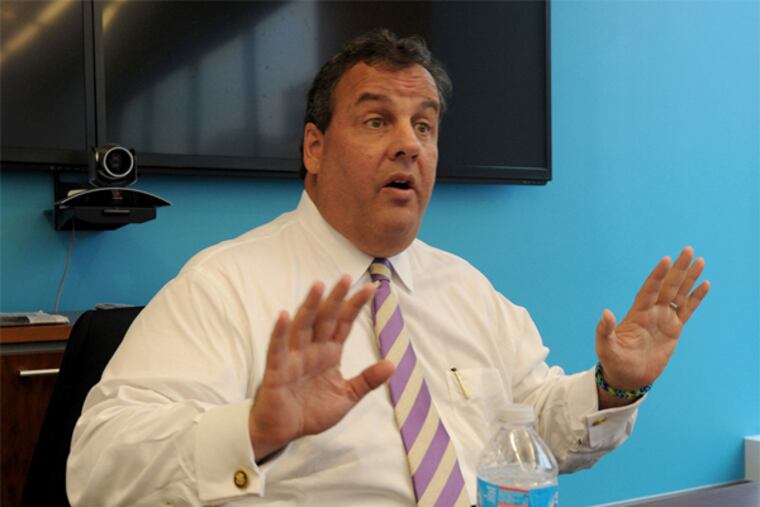Christie lists objections to tuition bill
TRENTON Gov. Christie said Monday that he would not sign a bill extending in-state college tuition rates to undocumented immigrants because the students also would be allowed to receive state financial aid.

TRENTON Gov. Christie said Monday that he would not sign a bill extending in-state college tuition rates to undocumented immigrants because the students also would be allowed to receive state financial aid.
Christie's explanation, given at a Statehouse news conference, came a week after the Republican governor announced on a radio show that he opposed parts of the bill passed recently by the Senate.
His remarks drew accusations of flip-flopping from bill supporters, who said Christie had voiced support for tuition equality before the gubernatorial election to court Latino voters but changed his position on the politically delicate issue to prepare to run for president.
On Monday, Christie said that wasn't the case. "I don't think this is any different position than I've had all along," he said. He said he continues to support tuition equality for undocumented students who came here "through no fault of their own" and who have attended the state's schools.
Senate President Stephen Sweeney (D., Gloucester) immediately accused Christie of "finding excuses to oppose" the bill.
Christie listed three objections, including expanding access to state financial aid. Christie also objected to a provision that would allow boarding school students to pay in-state tuition and to the lack of a prohibition on students who illegally immigrate to the United States in the future from receiving in-state tuition.
Christie would limit in-state tuition to undocumented students who immigrated by 2012, he said, citing an executive order by President Obama that granted some young undocumented immigrants temporary relief from deportation if they arrived by 2012, among other factors.
"I am not for an open-ended commitment not even the president of the United States was willing to grant," Christie said.
He said he would sign the bill if lawmakers amended it to address his concerns.
Sweeney, responding to Christie's remarks, said he would not change the bill and called the governor's assertion that he had not changed his position "bull."
"He said he supported in-state tuition," Sweeney said at a news conference in his Statehouse office. Christie said he supported tuition equality during a debate before the gubernatorial election and at a dinner of the Latino Leadership Alliance of New Jersey.
Christie did not say whether he supported state aid for undocumented immigrants. But "the bill that was in committee was our bill," Sweeney said. "He could have easily said back then, 'I support the concept, but I don't support the Senate bill.' "
Fifteen states have passed tuition equality laws, and three more have state universities with similar policies, according to New Jersey Policy Perspective, a left-leaning think tank.
Three states - Texas, California and New Mexico - allow undocumented immigrants access to state aid.
Sweeney said that cutting state aid from the bill would run counter to its intent. "You've relegated the people you're trying to put on equal footing as second-class citizens," he said.
He said Christie's concern about boarding school students "was not real," questioning how many students at prep schools were opting to attend Rutgers University.
The bill requires that students attend a New Jersey high school for at least three years and graduate in New Jersey or earn the equivalent of a high school diploma. Legislative staff have said the bill is tied to school attendance instead of residency to avoid violating federal law.
While Sweeney said he needed to talk to leaders in the Senate and Assembly about the bill, "I don't see how I could possibly concur with" Christie's proposed changes.
Neither Christie nor Sweeney would comment on their conversations about the bill. Sweeney said he had not heard objections to the bill until after it passed the Senate Budget Committee Nov. 14.
In a statement, Udi Ofer, executive director of the New Jersey American Civil Liberties Union, urged Christie "to resist rejecting a critical policy reform that would help thousands of New Jerseyans based on the remote chance that the New Jersey Dream Act could potentially be misapplied."
"It is important that New Jersey not make public policy decisions based on exceptions to the rule," Ofer said.
Also on Monday, Christie announced his nomination of Kevin O'Dowd, his chief of staff, to become attorney general.
If confirmed by the Senate, O'Dowd will succeed John Hoffman, who became acting attorney general this year after Christie appointed Attorney General Jeffrey S. Chiesa to the U.S. Senate, replacing the late Sen. Frank R. Lautenberg. Cory Booker was elected in October to replace Chiesa's interim appointment.
Christie said O'Dowd, like Chiesa a colleague of his at the U.S. Attorney's Office in Newark, had served him "extraordinarily well over the last 10 years." He said Hoffman had done "an outstanding job," but O'Dowd was "the best person I could select."
The nomination won praise from Senate Republicans and Sweeney, who called O'Dowd "the ultimate professional" and indicated no opposition to the selection.